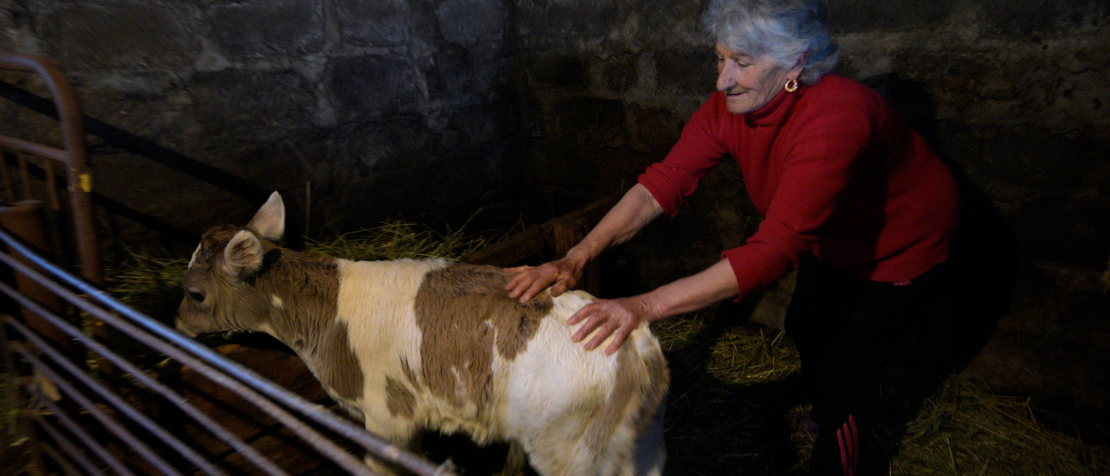FAO survey closely examines antimicrobial use in Armenia’s livestock sector

©FAO/Karen Minasyan
The Food and Agriculture Organization of the United Nations (FAO) hosted a groundbreaking workshop that unveiled the findings of a pioneering survey on antimicrobials use (AMU) within the food and veterinary sector in Armenia. The survey, the first of its kind in Armenia, represents a significant step towards understanding and addressing the challenges posed by antimicrobial resistance (AMR) to the country's vital livestock sector.
Antimicrobial resistance is the ability of microorganisms to persist or grow despite the presence of drugs designed to inhibit or kill them. When microorganisms become resistant to antimicrobials, standard treatments often fail. For livestock owners, this causes production losses, damaged livelihoods, and jeopardizes food security.
This comprehensive survey focused on key actors within the food and veterinary sector, including farmers from priority livestock production systems, field veterinarians, veterinary pharmacies, and feed mills. The analysis of the survey data revealed knowledge gaps and inappropriate practices surrounding antimicrobial use. Based on this information, intervention measures can now be developed and implemented to promote the responsible and judicious use of antimicrobials, thereby curbing the development of AMR. These measures not only hold the potential to safeguard animal health and welfare but also to enhance livestock productivity.
The collection and analysis of samples from surveyed livestock farms for antimicrobial resistance testing was a notable component of the survey. The results from the laboratory testing of the samples will be instrumental in establishing a national baseline for AMR in Armenia, paving the way for more effective strategies to combat its emergence and spread.
The workshop served as a forum for knowledge exchange, bringing together a diverse range of relevant actors, including representatives from Armenia’s Ministry of Economy, Ministry of Health, State Food Safety Inspection Body, farmers' associations, and other interested parties.
“FAO is supporting the counterparts in Armenia to strengthen laboratory capacities and AMR surveillance capabilities. To that end, we provide them the appropriate equipment, the knowledge to use it and help develop national action plans for AMR risk mitigation and strengthen regulatory and legal framework to minimize the misuse of antimicrobials,” said Zaruhi Beglaryan, FAO Programme Manager.
“The Ministry of Economy of the Republic of Armenia attaches importance to the regulation of the proper use of antimicrobial drugs in the field of agriculture. Since more than 50 percent of antimicrobial drugs are used in the field of agriculture, therefore, the measures aimed at preventing the spread AMR need to be carried out in a coordinated through multisectoral collaboration, said the Deputy Minister of Economy of the Republic of Armenia, Ashkhen Shirvanyan.
This survey is part of the larger project on reducing the advance of antimicrobial resistance in food and agriculture. This project is centred on strengthening knowledge and creating an enabling environment in targeted countries, including Armenia, with a primary focus on achieving the following objectives:
- Enhanced awareness among key national actors and the public regarding the risks associated with AMR for humans, food, animals, plants, and the environment.
- Increased active involvement of the food and agriculture sector in the development of multi-sectoral national action plans on AMR.
- Improved ability of target countries to assess and analyse existing knowledge about antimicrobial resistance and use.
- Strengthened capacities and regulatory frameworks related to antimicrobial use in food, agriculture, fisheries, and livestock.
- Establishment of integrated surveillance systems on AMR, supported by assessments and the strengthening of national laboratories and related infrastructure for the collection and sharing of data on the detection of AMR and antimicrobial residue.
The survey is an important output of FAO’s work to strengthen the ability of countries of Central Asia and the South Caucasus to combat the rise of AMR to protect human, animal, and environmental health. The results of the survey will provide a baseline for the development of regulatory platforms and legislation, it will improve the capacity of national laboratories to collect and use data on antimicrobial use, AMR, and antimicrobial residues, and escalate practices to minimize the need for and use of antimicrobials.
13 September 2023, Yerevan, Armenia
- FAO Antimicrobial Resistance webpages
- FAO project: Reducing the advance of AMR in food and agriculture
- Ad hoc Codex Intergovernmental Task Force on Antimicrobial Resistance (TFAMR)
- The Quadripartite on AMR webpage
- WHO Antimicrobial Resistance webpage
- World Organisation for Animal Health AMR webpage
- One Health at FAO
